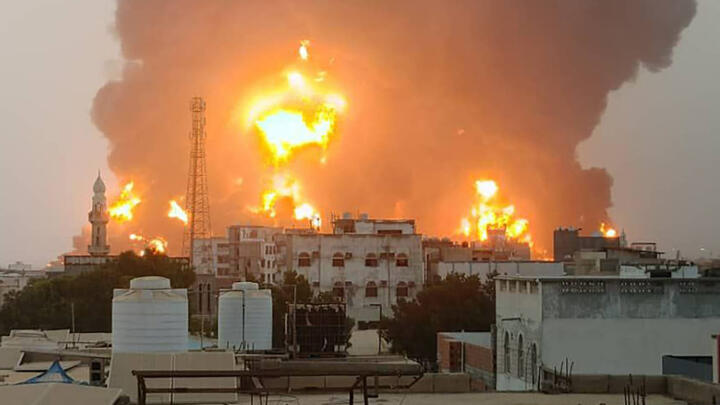Escalating Tensions: Israeli Airstrikes Target Houthi-Controlled Sanaa
As the conflict in the Middle East grows increasingly complex, Israel’s military operations have taken a significant turn with the recent airstrikes on Yemen’s capital, Sanaa. Early Thursday, a series of strikes were executed against facilities controlled by the Houthi rebels, which have been implicated in ongoing regional hostilities.
Targets of the Airstrikes
The strikes specifically targeted energy facilities and installations in the Red Sea port city of Hodeida. The Israeli military issued a statement confirming that the targets hit were being utilized by Houthi forces for military purposes. “These strikes aim to weaken the Houthi terrorist regime, preventing it from using these facilities for military and terrorist operations, including the smuggling of Iranian weapons into the region,” the statement read.
Missile Threats and Precautionary Measures
This military action from Israel comes on the heels of a missile threat from the Houthis; they reportedly launched missiles towards Israeli territory, although the Israel Defense Forces (IDF) successfully intercepted them. IDF spokesperson, Daniel Hagari, confirmed that while the missiles did not reach Israeli soil, sirens were activated in areas around Tel Aviv as a precaution. Local residents reported hearing loud explosions, which were attributed to debris from the intercepted missiles.
The Houthi Response
While the Houthis did not immediately claim responsibility for the missile launch, they hinted that a statement would follow, possibly outlining their position on the incident. Historically, the Houthi group has engaged in similar tactics during previous escalations, often timing their responses to coincide with other regional developments.
Wider Implications of Houthi Aggression
The recent aggressions by the Houthi group against Israel, which include attacks on shipping vessels, are seen as part of a broader strategy to express solidarity with the Palestinian cause amidst rising tensions in Gaza due to the ongoing conflict with Hamas. As of now, the Gaza Health Ministry, which is controlled by Hamas, reports over 45,000 deaths since the war restarted in October 2023.
The Impact on Maritime Security
Since the onset of the Israel-Hamas war, the Houthis have targeted more than 100 merchant vessels in a show of force and capability. However, Houthi-controlled media have yet to provide information regarding potential damage or casualties stemming from the Israeli airstrikes on Thursday.
Regional Escalation and the Iranian Connection
Both the missile launches and subsequent airstrikes signal an intense escalation of hostilities in the region. Israel’s military actions can be interpreted as a direct response to threats posed by groups allied with Iran, including Hezbollah in Lebanon and the Houthis in Yemen. The dynamics of these alliances underscore the precarious balance of power in the Middle East, where proxy conflicts increasingly intertwine with state-level military actions.
Conclusion
The situation remains fluid and continues to evolve, with the potential for further military engagements looming. The airstrikes on Sanaa not only signify Israel’s intent to counter perceived threats but also illustrate the interconnectedness of Middle Eastern conflicts. As nations respond to provocations, the ramifications for regional stability become more pronounced, creating a climate of uncertainty that affects both local and international security landscapes.
As developments unfold, the world watches closely to gauge the implications of this latest round of violence and military posturing, understanding that the outcome could have far-reaching consequences beyond the immediate conflict.
